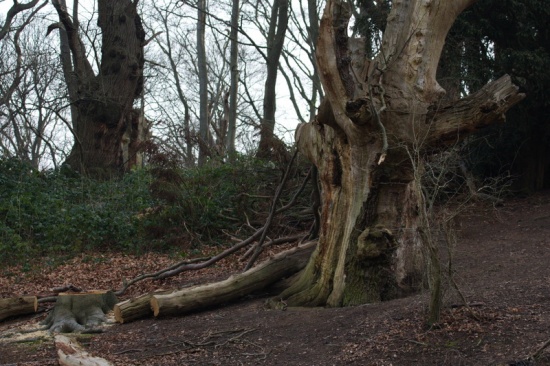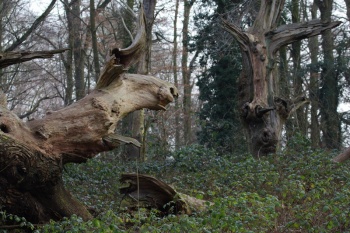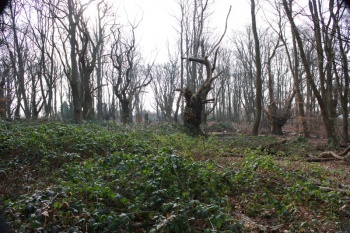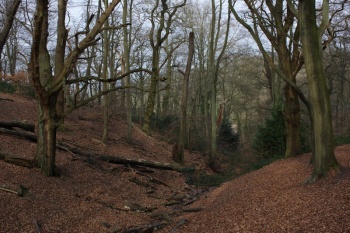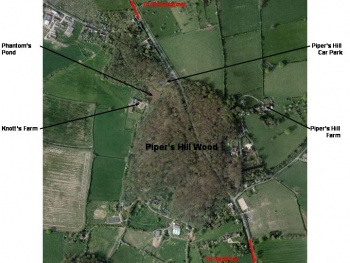(Website added, Links) |
|||
| Line 7: | Line 7: | ||
==Birds== | ==Birds== | ||
===Notable Species=== | ===Notable Species=== | ||
| − | The most abundant single species is the Jackdaw, without doubt; the woods are a cacophony of the Jackdaws' high-pitched 'kyak's. The nature of the ancient broadleaved trees and their propensity of dropping branches and leaving holes in their trunks provides excellent nesting opportunities for the plentiful, noisy Jackdaws. | + | The most abundant single species is the [[Eurasian Jackdaw|Jackdaw]], without doubt; the woods are a cacophony of the Jackdaws' high-pitched 'kyak's. The nature of the ancient broadleaved trees and their propensity of dropping branches and leaving holes in their trunks provides excellent nesting opportunities for the plentiful, noisy Jackdaws. |
| + | |||
| + | The Jackdaws are not the only hole-dwelling species to be found at Piper's Wood with all three indigenous species of Woodpecker, [[Little Owl]] and [[Stock Dove]] being present. Similarly there are several species of Tit to be found including [[Blue Tit|Blue]], [[Great Tit|Great]], [[Coal Tit|Coal]] and [[Long-tailed Tit|Long-tailed Tits]] that share the environment with [[Eurasian Treecreeper|Treecreepers]] and [[Eurasian Nuthatch|Nuthatch]]. | ||
[[Image:Pipers Hill_opus2.JPG|thumb|350px|right|Photo by {{user|Sy+V|Sy V}}<br />Piper's Hill Wood]] | [[Image:Pipers Hill_opus2.JPG|thumb|350px|right|Photo by {{user|Sy+V|Sy V}}<br />Piper's Hill Wood]] | ||
| Line 13: | Line 15: | ||
{{BirdsSee| | {{BirdsSee| | ||
}} | }} | ||
| − | |||
==Other Wildlife== | ==Other Wildlife== | ||
[[Image:Pipers Hill_opus3.JPG|thumb|350px|right|Photo by {{user|Sy+V|Sy V}}<br />Piper's Hill Woods]] | [[Image:Pipers Hill_opus3.JPG|thumb|350px|right|Photo by {{user|Sy+V|Sy V}}<br />Piper's Hill Woods]] | ||
| − | The ancient trees are fantastic for fungi and more than 200 species have been found. Associated with Beech, the golden Chanterelle with its elegant shape and frilled edge, is only found in the wild. They have a slightly spiced flavour with a fruity fragrance. Beefsteak fungus can also be found: it looks and tastes remarkably like steak. The Bracket fungus, which especially favours oak, is also common here and can grow to 10 centimetres in diameter perpendicular to the trunk. | + | The ancient trees are fantastic for fungi and more than 200 species have been found. Associated with Beech, the golden Chanterelle with its elegant shape and frilled edge, is only found in the wild. They have a slightly spiced flavour with a fruity fragrance. Beefsteak fungus can also be found: it looks and tastes remarkably like steak. The Bracket fungus, which especially favours oak, is also common here and can grow to 10 centimetres in diameter perpendicular to the trunk.<br /> |
| − | The old fish pond at the edge of the wood is inhabited by a variety of freshwater invertebrates and is worth visiting if you don't mind sharing it with the resident Phantom. | + | The old fish pond at the edge of the wood is inhabited by a variety of freshwater invertebrates and is worth visiting if you don't mind sharing it with the resident Phantom.<br /> |
These days the wood is not rich in flowers because since grazing ceased saplings have taken hold on the forest floor however, some uncommon flora species such as bird's-nest orchid can be found. | These days the wood is not rich in flowers because since grazing ceased saplings have taken hold on the forest floor however, some uncommon flora species such as bird's-nest orchid can be found. | ||
===History and Use=== | ===History and Use=== | ||
[[Image:Pipers Hill_opus4.JPG|thumb|350px|right|Photo by {{user|Sy+V|Sy V}}<br />Piper's Hill Woods]] | [[Image:Pipers Hill_opus4.JPG|thumb|350px|right|Photo by {{user|Sy+V|Sy V}}<br />Piper's Hill Woods]] | ||
| − | The woods and common have been grazed since at least the 6th Century A.D. The owner granted rights to commoners that allowed grazing by their livestock. Often trees were intentionally planted and protected from grazing animals to produce widely spaced trees with a grass-covered woodland floor with few shrubs – something akin to woodland and parkland. | + | The woods and common have been grazed since at least the 6th Century A.D. The owner granted rights to commoners that allowed grazing by their livestock. Often trees were intentionally planted and protected from grazing animals to produce widely spaced trees with a grass-covered woodland floor with few shrubs – something akin to woodland and parkland.<br /> |
The trees were often pollarded (head-height branches removed and used for small timber) and allowed to re-grow. The oldest trees in the reserve are several hundred years old, and many bear evidence of pollarding. | The trees were often pollarded (head-height branches removed and used for small timber) and allowed to re-grow. The oldest trees in the reserve are several hundred years old, and many bear evidence of pollarding. | ||
Many trees within the reserve are ancient Beech, Sweet Chestnut pollards and big Oaks, believed to be 300-400 years old. Most show spreading crowns indicative of trees that have grown in such conditions. | Many trees within the reserve are ancient Beech, Sweet Chestnut pollards and big Oaks, believed to be 300-400 years old. Most show spreading crowns indicative of trees that have grown in such conditions. | ||
| Line 31: | Line 32: | ||
===Access and Facilities=== | ===Access and Facilities=== | ||
[[Image:Slide1.JPG|thumb|350px|right|Photo by {{user|Sy+V|Sy V}}<br />Image of the Reserve]] | [[Image:Slide1.JPG|thumb|350px|right|Photo by {{user|Sy+V|Sy V}}<br />Image of the Reserve]] | ||
| − | Piper's Hill Woods and Dodderhill Common can be found straddling the B4091 between the North Worcestershire market town of Bromsgove and the village of Hanbury. The nearest towns of significant size are Bromsgrove (4 miles North) and Redditch (7 miles East). | + | Piper's Hill Woods and Dodderhill Common can be found straddling the B4091 between the North Worcestershire market town of Bromsgove and the village of Hanbury. The nearest towns of significant size are Bromsgrove (4 miles North) and Redditch (7 miles East).<br /> |
| − | The Car Park of this reserve is at (British National Grid): SO956652. | + | The Car Park of this reserve is at (British National Grid): SO956652.<br /> |
Piper's Hill lies approximately 3 miles East of junction 5 of the M5. | Piper's Hill lies approximately 3 miles East of junction 5 of the M5. | ||
| Line 39: | Line 40: | ||
===Contact Details=== | ===Contact Details=== | ||
For further information on this, or any other Worcestershire Wildlife Trust (WWT) reserve, please contact: | For further information on this, or any other Worcestershire Wildlife Trust (WWT) reserve, please contact: | ||
| − | WWT, | + | WWT,<br /> |
| − | Lower Smite Farm, | + | Lower Smite Farm,<br /> |
| − | Smite Hill, | + | Smite Hill,<br /> |
| − | Hindlip, | + | Hindlip,<br /> |
| − | Worcester, | + | Worcester,<br /> |
| − | WR3 8SZ. | + | WR3 8SZ. <br /> |
| − | Phone 01905 754919, | + | Phone 01905 754919, <br /> |
| − | Fax 01905 755868, | + | Fax 01905 755868, <br /> |
Email [[email protected]] | Email [[email protected]] | ||
| Line 58: | Line 59: | ||
==External Links== | ==External Links== | ||
| − | [http://www.streetmap.co.uk/map.srf?x=395650&y=265250&z=0&sv=SO956652&st=5&mapp=map.srf&searchp=ids.srf Piper's Hill Woods Car Park shown on Street Map] | + | *[http://www.worcswildlifetrust.co.uk/index.php?section=places:reserves&reserveid=87 Worcester Wildlife Trust] |
| + | *[http://www.streetmap.co.uk/map.srf?x=395650&y=265250&z=0&sv=SO956652&st=5&mapp=map.srf&searchp=ids.srf Piper's Hill Woods Car Park shown on Street Map] | ||
[[Category:Locations]][[Category:Worcestershire]] | [[Category:Locations]][[Category:Worcestershire]] | ||
Revision as of 13:25, 6 March 2009
| This article is incomplete. This article is missing one or more sections. You can help the BirdForum Opus by expanding it. |
Overview
The reserve comprises a unique, 39 acre woodland pasture, containing some of the oldest trees in the country surrounded by arable land, a small proportion of which is Common land. Worcestershire Wildlife Trust acquired the site to protect the old trees and their associated wildlife.
Birds
Notable Species
The most abundant single species is the Jackdaw, without doubt; the woods are a cacophony of the Jackdaws' high-pitched 'kyak's. The nature of the ancient broadleaved trees and their propensity of dropping branches and leaving holes in their trunks provides excellent nesting opportunities for the plentiful, noisy Jackdaws.
The Jackdaws are not the only hole-dwelling species to be found at Piper's Wood with all three indigenous species of Woodpecker, Little Owl and Stock Dove being present. Similarly there are several species of Tit to be found including Blue, Great, Coal and Long-tailed Tits that share the environment with Treecreepers and Nuthatch.
Check-list
Birds you can see here include:
Other Wildlife
The ancient trees are fantastic for fungi and more than 200 species have been found. Associated with Beech, the golden Chanterelle with its elegant shape and frilled edge, is only found in the wild. They have a slightly spiced flavour with a fruity fragrance. Beefsteak fungus can also be found: it looks and tastes remarkably like steak. The Bracket fungus, which especially favours oak, is also common here and can grow to 10 centimetres in diameter perpendicular to the trunk.
The old fish pond at the edge of the wood is inhabited by a variety of freshwater invertebrates and is worth visiting if you don't mind sharing it with the resident Phantom.
These days the wood is not rich in flowers because since grazing ceased saplings have taken hold on the forest floor however, some uncommon flora species such as bird's-nest orchid can be found.
History and Use
The woods and common have been grazed since at least the 6th Century A.D. The owner granted rights to commoners that allowed grazing by their livestock. Often trees were intentionally planted and protected from grazing animals to produce widely spaced trees with a grass-covered woodland floor with few shrubs – something akin to woodland and parkland.
The trees were often pollarded (head-height branches removed and used for small timber) and allowed to re-grow. The oldest trees in the reserve are several hundred years old, and many bear evidence of pollarding.
Many trees within the reserve are ancient Beech, Sweet Chestnut pollards and big Oaks, believed to be 300-400 years old. Most show spreading crowns indicative of trees that have grown in such conditions.
Areas of Interest
The woodland area is also known as Hanbury Woods, which, according to local folklore are haunted by a Phantom who frequents the area of the pond near Knott's Farm.
Access and Facilities
Piper's Hill Woods and Dodderhill Common can be found straddling the B4091 between the North Worcestershire market town of Bromsgove and the village of Hanbury. The nearest towns of significant size are Bromsgrove (4 miles North) and Redditch (7 miles East).
The Car Park of this reserve is at (British National Grid): SO956652.
Piper's Hill lies approximately 3 miles East of junction 5 of the M5.
The reserve is open 24 hours a day, 7 days a week and all year 'round. Dogs are allowed but must be kept on leads at all times.
Contact Details
For further information on this, or any other Worcestershire Wildlife Trust (WWT) reserve, please contact:
WWT,
Lower Smite Farm,
Smite Hill,
Hindlip,
Worcester,
WR3 8SZ.
Phone 01905 754919,
Fax 01905 755868,
Email [[email protected]]




